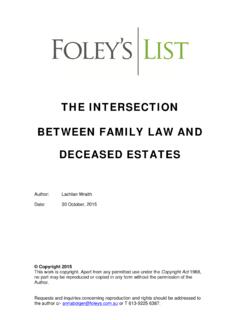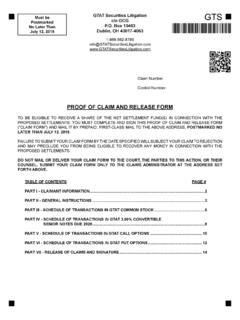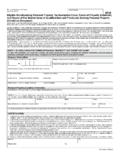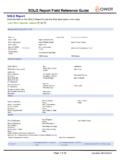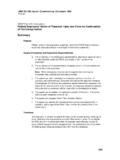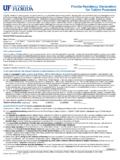Transcription of The Decison not the Disability - Foley's
1 THE DECISION NOT THE Disability Author: Nawaar Hassan Date: 1 July, 2014 Copyright 2014 This article was originally published in the Law Institute Journal issue of July 2014. Requests and inquiries concerning reproduction and rights should be addressed to the author c/- or T 613-9225 6387. 40 LIJ JULY 2014 ILLO TO COME BY 29 MAY41 LIJ JULY 2014 PeRsOnaL InJURIesThe decision, not the disabilitysuccessful, the court will often substitute its own decision for that of the insurer and then remit the matter back to the trustee for recon-sideration based on the court s insured under a group insurance policy is the trustee. The insurer has no contractual relationship with the claimant and no liability to pay them directly. Yet it is the claimant who, through the trustee, has paid the premiums and who expects the benefit of the insurance. For this reason, the courts have held that despite the lack of contractual relationship, the same duties of good faith and fair dealing apply between the insurer and the claim-ant as between the insurer and the The claimant has standing to sue the insurer directly to enforce the insurance TRUSTEE S DUTIESThe trust deed will often provide that the trus-tee s discretion in making decisions to pay any benefit is absolute and unfettered.
2 For many years it was held that the duties of trustees of superannuation funds were no different to any other trustee exercising a discretion-a r y The courts would only interfere with those decisions in very limited circum-stances. Those were known as the principles in Karger v These principles, as summa-rised in the TPD context in Rapa v Patience,6 meant that the grounds of challenge were that: the discretion was not exercised in good faith;Total and permanent Disability (TPD) claims to superannuation funds have become an impor-tant part of any personal injuries practice. While the exact criteria differ, superannuation fund members are often entitled to TPD benefits where they have not engaged in any work for a period of time and are unlikely ever to engage in work for which they are reasonably fit by their educa-tion, training or successfully challenge a rejected claim for total and permanent Disability benefits, the claimant must show that the superannuation trustee or its insurer breached one of its duties.
3 By nawaar HassanILLUSTRATION CHRISTOPHER NIELSENA lthough a TPD claim often follows an injury, when a claimant wants to challenge a rejected claim, the approach to litigation must be fun-damentally different to traditional personal injuries litigation. It is generally not enough simply to present medical material to con-vince the court that the client is in fact totally and permanently disabled. To successfully challenge a TPD rejection, the claimant must establish that in rejecting the claim the deci-sion maker breached one of its duties. The focus is therefore not necessarily on the fact of Disability but on the decision making FUND MEMBER, THE INSURED AND ITS INSURERA claimant usually has to deal with two decision makers: the trustee of the superan-nuation fund and its claimant s entitlement to benefits is defined by the trust deed establishing the superannuation fund. The deed usually sets out the eligibility criteria for TPD benefits.
4 The trustee will often obtain a group insur-ance policy to fund TPD claims. The deed may provide that the trustee has no liability to pay a TPD benefit unless the insurer agrees to indemnify it, or that the eligibility criteria are identical to those in the insurance policy. The claimant will therefore often have to challenge both the insurer s and the trustee s decisions to succeed. In practice however, if the challenge to the insurer s decision is 42 LIJ JULY 2014 PeRsOnaL InJURIesThe Court held that there was no onus of proof on Mr Frost to satisfy the trustee of his claim. Where a claimant has put forward material to indicate that their application may have merit, or where there are inconsistencies in the material put forward, the trustee is under a high duty to make further reason-able inquiries. While the trustee is not under an obligation to go on endlessly seeking more and more information until the claim is made out, it must at least make inquiries to under-stand the points of disagreement and try to reconcile the apparent inconsistencies.
5 Justice Nettle held that [f]or the trustee to slough off responsibility for making those inquiries on the basis that Mr Frost failed to adduce suf-ficient evidence to satisfy the trustee that he was totally and permanently disabled is .. to do the very thing which the High Court said in Finch was unacceptable .15 Similarly, in Colella v Hannover Life Re of Australasia Ltd (No 2)16 the County Court of Victoria held that a duty to make further inquiries was part of the insurer s duty to act reasonably. A medical report referred to Mr Colella having undergone surgery and said that the opinion of the orthopaedic surgeon was a matter to be taken into account in deter-mining his future work capacity. The insurer did not seek a report from the orthopaedic surgeon. The Court said: Given the nature of the defendant s duty towards the plaintiff, it was not appropriate for it to rely upon only those aspects of the material before it which were most suited to a denial of the plaintiff s claim.
6 In failing to seek or obtain material from the plaintiff s treating orthopaedic spe-cialist, it acted unreasonably .17 Duty to act reasonably: The duty to make inquiries to resolve conflicts in material does not necessarily mean that the claim must be accepted where there is some material sup-porting the relevant information has been gathered and the other duties fulfilled, the rejection of the claim will only be overturned if the decision is so unreasonable that no rea-sonable trustee or insurer could have made it. This is a high Chapman v United Super Pty Ltd18 the Supreme Court of New South Wales high-lighted that the definition of TPD in some policies is extremely hard to satisfy. In that case there was medical evidence both ways. While there was sufficient material which would have enabled the trustee or insurer to come to the conclusion that Mr Chapman satisfied the definition, there was also sub-stantial medical evidence that his condition was not as severe as he Young said that: If I were the per-son that had to make a decision, on the balance of probabilities, as to the plaintiff s inability to work any job that his training and experi-ence allowed him to do.
7 I may have come to the discretion was not exercised upon real and genuine consideration; the discretion was not exercised for the purposes for which it was conferred; if the reasons for the exercise of the dis-cretion were given, the reasons were not sound; or the decision is one that no reasonable trus-tee could make on the material which was before 52 of the Superannuation Industry (Supervision) Act 1993 imposes further duties by requiring the trustee to: act honestly; exercise the trustee s powers in the best interests of the beneficiaries; and do everything reasonable to pursue an insurance claim with reasonable prospect of success for the benefit of a INSURER S DUTIESThe trustee s insurer owes the claimant a duty to act in utmost good faith. That obliga-tion includes duties to: act reasonably; deal with the claimant fairly; consider and determine the correct ques-tion; and give the claimant an opportunity to answer any adverse material on which the insurer intends to : A NEW APPROACHMany trust deeds and policies provide for benefits to be paid where the claimant fulfils the eligibility criteria in the trustee s or insur-er s opinion or to their satisfaction.
8 In those cases, the right to benefits depends not on the objective fact of Disability , but on the decision maker s High Court s decision in Finch v Telstra Super Pty Ltd (Finch)7 marked a clear shift in the way courts approach a challenge to that opinion. Courts are now scrutinising more closely the decision making process and hold-ing superannuation trustees and insurers to higher Finch, the Court made clear that a super-annuation trustee s decision making power is not a mere discretion like any other. Different criteria apply to the operation of a superan-nuation fund from those which apply to discretionary decisions made by trustees of other types of The Court noted that while the term discretion is used in the description or characterisation of varied acts or omissions in the law, the term may be an inadequate description of an inquiry which requires the identification and evaluation of factual matters .9 The Court emphasised that, despite a pro-vision in the trust deed that the trustee s discretion was absolute, the trust was in reality a strict trust.
9 The trustee had a duty to distribute to those who fall within the def-inition of TPD and not to distribute to those who did not. The trustee s power to form opinions was not a matter of discretion-ary power to think one thing or the other; it was an ingredient in the performance of a trust duty . Mr Finch was the beneficiary of a trust, and although the precise form and quantum of his beneficial interest was con-tingent on particular events, he did have a beneficial interest .10 In essence, the Court emphasised that the power to form an opin-ion did not give the trustee a power to refuse to distribute benefits to those who satisfied the relevant TPD Court did not decide to what extent the duties in Karger v Paul should continue to apply. However, in assessing whether they had been breached, the Court emphasised the need to consider that superannuation is not a matter of mere bounty .. It is something for which, in large measure, employees have exchanged value their work and contribu-tions.
10 11 It is also, for some people, their most significant asset. The legitimate expecta-tions which beneficiaries of superannuation funds have that decisions about benefit will be soundly taken are thus high. So is the general public importance of them being sound .12 The decision in Finch related only to trus-tees as no insurer was involved. The duties of trustees and insurers are different in nature and origin. However, the High Court s com-ments about the importance of rigorous decision making by trustees apply equally to insurers in this context. The emphasis on the strict duty of trustees to distribute benefits to those who fulfil the criteria aligns with the insurer s similar contractual duty and results in similar requirements being DUTIES IN ACTION SOME EXAMPLESDuty to make inquiries: In Finch, the Court held that the trustee s duty to make decisions upon real and genuine consideration includes a duty to give properly informed considera-tion.


